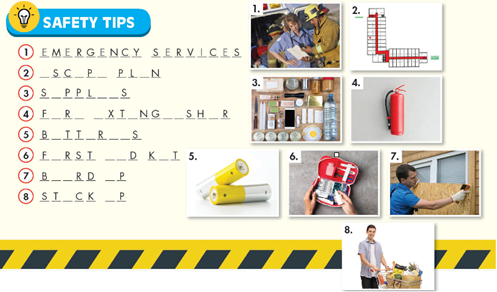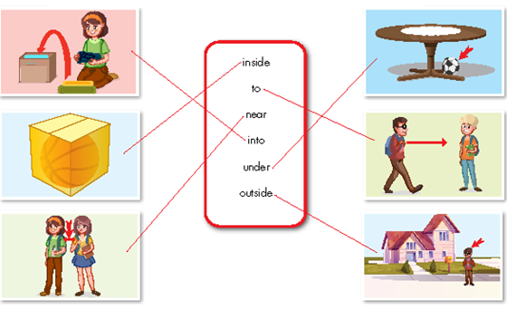Lesson 2 - Unit 4. Disasters - SBT Tiếng Anh 8 iLearn Smart World
a. Complete the words with the vowels (a, e, i, o, u). b. Fill in the blanks using the words from Task a. a. Listen to someone talking to students about disasters. Who is the man? b. Now, listen and circle. Draw lines to match the prepositions of place and movement to the pictures. Write one thing people should / shouldn’t do to prepare for and one thing people should / shouldn’t do during three different disasters. Use prepositions of place and movement.
New Words a
a. Complete the words with the vowels (a, e, i, o, u).
(Hoàn thành các từ với các nguyên âm (a, e, i, o, u).)

Lời giải chi tiết:
1. emergency services (dịch vụ khẩn cấp)
2. escape plan (kế hoạch trốn thoát)
3. supplies (nguồn cung cấp)
4. fire extinguisher (bình chữa cháy)
5. batteries (pin)
6. first aid kit (bộ túi sơ cứu)
7. board up (bịt kín)
8. stock up (dự trữ)
New Words b
b. Fill in the blanks using the words from Task a.
(Điền vào chỗ trống sử dụng các từ trong Task a.)
1. I need to buy some _______ for my flashlight and TV mote.
2. You can put out some fires with water, but a _______ works better.
3. I fell over and hurt my knee. My mom used a _______ to clean it and make it feel better.
4. You should always have an _______. Sometimes you need to know the fastest way out of your house.
5. Having extra _______, like food, water, and clothes, is really important in a disaster.
6. You should _______ that window. I think the storm may break it.
7. Making a phone call to the _______ is one of the first things you should do during a fire.
8. You should _______ on food and medicine if you hear about a storm coming.
Lời giải chi tiết:

1. I need to buy some batteries for my flashlight and TV mote.
(Tôi cần mua một số pin cho đèn pin và TV.)
2. You can put out some fires with water, but a fire extinguisher works better.
(Bạn có thể dập tắt một số đám cháy bằng nước, nhưng bình chữa cháy hoạt động tốt hơn.)
3. I fell over and hurt my knee. My mom used a first aid kid to clean it and make it feel better.
(Tôi bị ngã và bị thương ở đầu gối. Mẹ tôi đã sử dụng sơ cứu trẻ em để làm sạch nó và làm cho nó cảm thấy dễ chịu hơn.)
4. You should always have an escape plan. Sometimes you need to know the fastest way out of your house.
(Bạn phải luôn có một kế hoạch thoát hiểm. Đôi khi bạn cần biết cách nhanh nhất để ra khỏi nhà.)
5. Having extra supplies, like food, water, and clothes, is really important in a disaster.
(Có thêm đồ dùng, như thức ăn, nước và quần áo, thực sự quan trọng trong thảm họa.)
6. You should board up that window. I think the storm may break it.
(Bạn nên bịt kín cửa sổ đó. Tôi nghĩ rằng cơn bão có thể phá vỡ nó.)
7. Making a phone call to the emergency services is one of the first things you should do during a fire.
(Gọi điện thoại cho dịch vụ khẩn cấp là một trong những việc đầu tiên bạn nên làm khi có hỏa hoạn.)
8. You should stock up on food and medicine if you hear about a storm coming.
(Bạn nên dự trữ lương thực và thuốc men nếu bạn nghe tin sắp có bão.)
Listening a
a. Listen to someone talking to students about disasters. Who is the man?
(Lắng nghe ai đó nói chuyện với học sinh về thảm họa. Người đàn ông là ai?)
1. the principal (hiệu trưởng)
2. a teacher (giáo viên)
3. a firefighter (lính cứu hỏa)
Bài nghe:
Miss White: Good morning, everyone.
Class: Good morning, Miss White.
Miss White: I would like to introduce a special guest. Say hello to Fire Chief Dunkin.
Class: Hello.
Fire Chief Dunkin: Good morning. I am here to talk to you about how to prepare and what to do during a disaster. The first disaster I want to talk about is a flood. You should keep supplies like batteries and flashlights in your home. During a flood, you should board up your windows. And this is very important. You shouldn’t go into the water because it might carry you away. Next, I want to talk about fires. To prepare, you should keep a fire extinguisher in a safe place. Other firefighters and I use these a lot, and they are very useful. During a house fire, first, you should go outside of your house quickly. Then, you should call the emergency services. We will come and help you. Next, I …
Tạm dịch:
Cô White: Chào buổi sáng mọi người.
Cả lớp: Chào buổi sáng, cô White.
Cô White: Tôi xin giới thiệu một vị khách đặc biệt. Nói xin chào với đội trưởng cứu hỏa Dunkin.
Cả lớp: Xin chào.
Đội trưởng đội cứu hỏa Dunkin: Chào buổi sáng. Tôi ở đây để nói chuyện với bạn về cách chuẩn bị và những việc cần làm trong một thảm họa. Thảm họa đầu tiên tôi muốn nói đến là lũ lụt. Bạn nên giữ các vật dụng như pin và đèn pin trong nhà. Trong một trận lụt, bạn nên đóng cửa sổ của bạn. Và điều này rất quan trọng. Bạn không nên xuống nước vì nó có thể cuốn bạn đi. Tiếp theo, tôi muốn nói về đám cháy. Để chuẩn bị, bạn nên để bình chữa cháy ở nơi an toàn. Những người lính cứu hỏa khác và tôi sử dụng những thứ này rất nhiều, và chúng rất hữu ích. Khi xảy ra cháy nhà, trước tiên, bạn nên nhanh chóng ra khỏi nhà. Sau đó, bạn nên gọi các dịch vụ khẩn cấp. Chúng tôi sẽ đến và giúp bạn. Tiếp theo, tôi…
Lời giải chi tiết:
3. a firefighter (lính cứu hỏa)
Thông tin: This conversation talk about about to prepare and what to do during a disaster of Fire Chief Dunkin.
(Cuộc trò chuyện này nói về việc chuẩn bị và những việc cần làm trong một thảm họa của Cảnh sát trưởng Dunkin.)
Listening b
b. Now, listen and circle.
(Bây giờ, hãy lắng nghe và khoanh tròn.)
According to the man:
1. You should keep batteries and flashlights / food in your house.
2. You should stay in your home / board up your windows during a flood.
3. You shouldn’t go into the water because it might damage your vehicle / carry you away.
4. You should keep a first aid kit / fire extinguisher in a safe place.
5. During a house fire, first, you should call the emergency services / go outside.
Lời giải chi tiết:

According to the man: (Theo người đàn ông:)
1. You should keep batteries and flashlights in your house.
(1. Bạn nên để pin và đèn pin trong nhà.)
2. You should board up your windows during a flood.
(Bạn nên bịt kín cửa sổ khi có lũ lụt.)
3. You shouldn’t go into the water because it might carry you away.
(Bạn không nên xuống nước vì nó có thể cuốn bạn đi.)
4. You should keep a fire extinguisher in a safe place.
(Bạn nên để bình chữa cháy ở nơi an toàn.)
5. During a house fire, first, you should go outside.
(Khi cháy nhà, trước tiên, bạn nên ra ngoài.)
Grammar
Draw lines to match the prepositions of place and movement to the pictures.
(Vẽ các đường để khớp các giới từ chỉ nơi chốn và chuyển động với các bức tranh.)

Lời giải chi tiết:

- inside (bên trong)
- to (đến)
- near (gần)
- into (vào trong)
- under (bên dưới)
- outside (bên ngoài)
Writing
Write one thing people should / shouldn’t do to prepare for and one thing people should / shouldn’t do during three different disasters. Use prepositions of place and movement.
(Viết một điều mọi người nên/không nên làm để chuẩn bị đối phó và một điều mọi người nên/không nên làm trong ba thảm họa khác nhau. Sử dụng giới từ chỉ địa điểm và chuyển động.)
Lời giải chi tiết:
To prepare for a fire, you should keep a fire extinguisher in a safe place.
During a fire, you should go outside of your house.
To prepare for a typhoon, you should board up your windows.
During a typhoon, you shouldn't go outside of your house.
To prepare for an earthquake, you should keep a first aid kit in every bathroom.
During an earthquake, you should go under a desk.
Tạm dịch:
Để chuẩn bị cho một đám cháy, bạn nên giữ bình chữa cháy ở nơi an toàn.
Trong khi hỏa hoạn, bạn nên ra khỏi nhà.
Để chuẩn bị cho một cơn bão, bạn nên đóng cửa sổ của bạn.
Trong cơn bão, bạn không nên ra khỏi nhà.
Để chuẩn bị cho một trận động đất, bạn nên giữ một bộ dụng cụ sơ cứu trong mỗi phòng tắm.
Trong một trận động đất, bạn nên chui xuống gầm bàn.
Luyện Bài Tập Trắc nghiệm Tiếng Anh 8 - iLearn Smart World - Xem ngay
Các bài khác cùng chuyên mục
- Semester 2 Mid-term Test - SBT Tiếng Anh 8 iLearn Smart World
- Semester 2 Final Test - SBT Tiếng Anh 8 iLearn Smart World
- Lesson 1 - Unit 8. Traditions of ethnic groups in Vietnam- SBT Tiếng Anh 8 iLearn Smart World
- Lesson 2 - Unit 8. Traditions of ethnic groups in Vietnam- SBT Tiếng Anh 8 iLearn Smart World
- Lesson 3 - Unit 8. Traditions of ethnic groups in Vietnam- SBT Tiếng Anh 8 iLearn Smart World













Danh sách bình luận